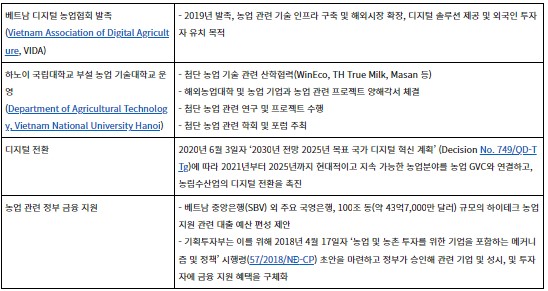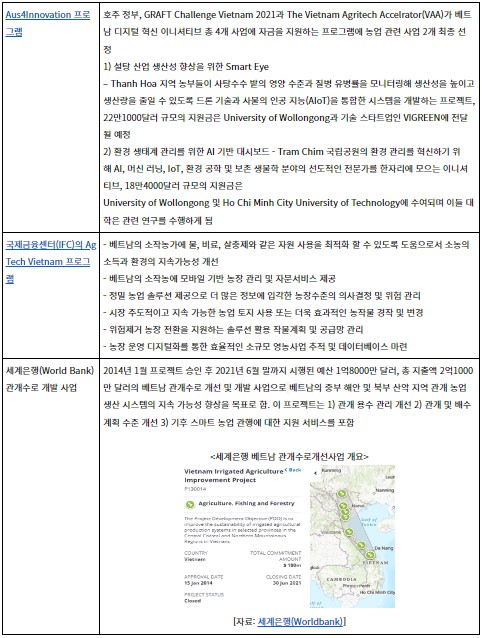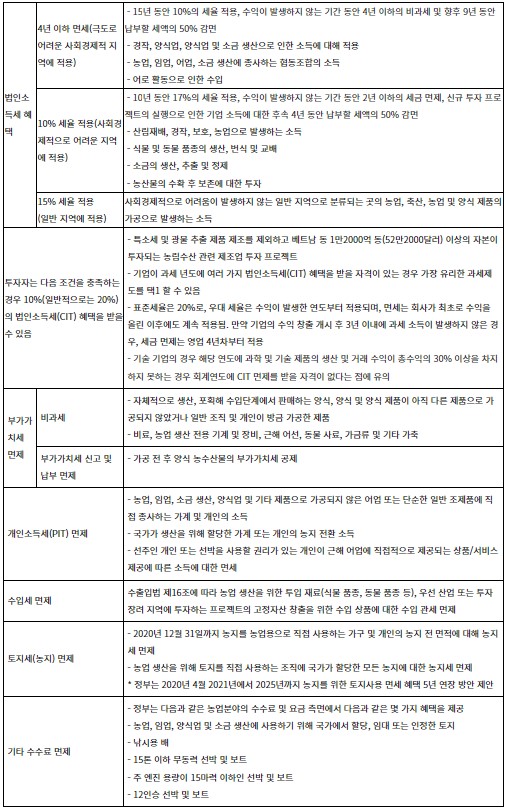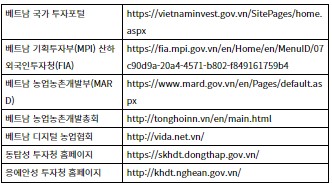– Rush of domestic and foreign corporate investment in agriculture-related digital transformation and smart farms
– Internet of Things, smart agriculture, agricultural machinery, etc. are promising
The Vietnamese government is offering support measures in many ways for the development and advancement of the agricultural sector. The agricultural sector has been included in the national digital innovation plan, and financial support for the agricultural sector is being prepared in cooperation with the central bank. The Government of Vietnam has approved the National Digital Transformation Plan (Decision No. 2020/QD-TTg) dated June 6, 3, targeting 2030 with a outlook to 2025. As part of the National Digital Transformation Plan, the Vietnamese government wants to promote the development of a 'modern and sustainable agriculture sector' and is working to connect agricultural GVCs and accelerate the digital transformation of the agricultural sector.
Meanwhile, the State Bank of Vietnam has proposed a high-tech agricultural sector financial support plan to promote high-tech investment in the agricultural sector and encourage related financial support benefits. The Government approved the Decree of April 2018, 4, "Mechanisms and Policies to Involve Enterprises for Agriculture and Rural Investment" (17/57/NĐ-CP) proposed by the Ministry of Planning and Investment, to specify financial support benefits for related enterprises, towns and cities, and investors.
<Vietnam Government's Support for Advanced Agricultural Development>

[Source: Comprehensive Enforcement Decree and KOTRA Hanoi Trade Center]
In addition, for the sustainability and development of Vietnam's agriculture, various international cooperative organizations and foreign government councils are conducting agricultural-related cooperative projects in Vietnam. Representative examples include the World Bank's Irrigated Agriculture Improvement project, which has already been closed, as well as the Australian government's Aus4Innovation program and the International Financial Center (IFC)'s AgTech Vietnam program.
<International Cooperation Project for Vietnam's Agricultural Development>

[Source: Comprehensive IFC, Worldbank, Aus4Innovation and KOTRA Hanoi Trade Center]
At the level of Vietnamese private companies, they are also focusing on the development of the agricultural sector through collaboration with global companies. Many Vietnamese conglomerates such as Thaco, Vingroup, FLC, FPT, Thegioididong and Hoa Phat have invested in this sector. Foreign companies investing in Vietnam's agriculture include Enzootic, a joint venture between Israel and Hong Kong, GoodHout BV of Thailand, SmartFarm Co Ltd, FairAgora Asia, GAGO of China, Intello Labs of India, Pycno Industries of Australia, Gintel of Taiwan and Fluence Corporation of Israel. -NIROBOX, etc.
E-commerce and agriculture
In the past, it was common to purchase locally produced agricultural products at traditional markets and grocery stores, but the social distancing of COVID-19 has accelerated the digital transformation that allows farmers and consumers to purchase agricultural and fishery products through e-commerce malls. Vietnam VNPT's Post Mart and Viettel's Viettel Post, which are Korea's post offices, have expanded their services to deliver agricultural and fishery products to the front of the house using courier services. It has received a good response by introducing a service that purchases from a mart or retail store and delivers it to your home. Even if farmers do not separately register on the mobile app or e-commerce mall, they can sell agricultural and fishery products online by delivering products to the retail stores and marts they traded in the past. It was able to compensate for the shortcomings of discarding or destroying the supply chain because agricultural products could not be properly distributed during the period.

Opportunities for foreign investors in agriculture
Utilize trends in agriculture-related government priority investment
Sustainable agriculture and agricultural value chain development are the priority investment areas of the Vietnamese government. To this end, the number of farms joining modern agricultural cooperatives has increased, and the number of farms cooperating with enterprises is also increasing. In the case of large corporations, smart farming methods are applied to agricultural products production to improve quality suitable for overseas export, and efforts are being made to increase production and improve quality by cooperating with overseas companies and investors. However, in order for small-scale farmers who lack capital and produce traditionally to become producers of high-quality agricultural products that meet international standards, government funding for agriculture and improvements in technology and supply chains in all areas are required.
Vietnam is one of the countries with a rapidly growing middle-class population, and as income per household increases, the number of households consuming organic products also increases, and domestic demand for high-quality agricultural products has increased. However, most of the organic products produced in Vietnam are grown for export, which is insufficient to meet domestic demand. If smallholder farms that produce general agricultural products in Vietnam are upgraded to farms that can produce organic products, it is possible to increase farm household income and satisfy the domestic demand for organic products at the same time. Again, due to the lack of funds for individual farms, a project to support general smallholder farms at the government or corporate level is necessary. If Vietnam can promote a project to improve the quality of production and increase production in Vietnam in cooperation with the Vietnamese government and enterprises, it can lead to win-win results for Vietnamese farmers, the government and investment companies.
Utilization of Free Trade Agreements
As of June 2022, Vietnam has signed a total of 6 free trade agreements (FTAs) and is negotiating with two free trade agreements (FTAs). In the case of Vietnam, compared to neighboring countries, the business scope of free trade agreements is large and the level of liberalization is relatively high. Active participation at the national level in various bilateral and multilateral free trade agreements provides many opportunities for local agricultural exporters to participate in global value chains. In addition, the expansion of free trade agreements will help attract more foreign capital to Vietnam and consequently motivate the country to improve the investment environment through safety for investors in all sectors of the economy.
<Vietnam's Multilateral and Bilateral Free Trade Agreements Recently Entered into Force>

[Source: VCCI]
Take advantage of government tax incentives related to agriculture
The Vietnamese government is providing various tax incentives to the agricultural sector to promote the sustainable development of Vietnamese agriculture and improve the income of farmers. Businesses and organizations can take advantage of the following tax preferential policies given to Vietnam's agricultural sector.
<Various tax preferential benefits given to agriculture>

[Source: Decree 2018/4/ND-CP dated April 17, 57 and KOTRA Hanoi Office]
Vietnam Agricultural Technology Certification and Regulatory Ministries
Government agencies that have a significant impact on the regulation and direction of agtech in Vietnam are the Ministry of Agriculture and Rural Development (MARD), the Ministry of Industry and Trade (MoIT) and the Ministry of Health. The detailed tasks each government department is responsible for are as follows.
<Government ministries related to agricultural technology recognition>

[Source: Vietnam Briefing]
Issuance of high-tech agricultural enterprise certificate
The Agricultural and Rural Development Administration is helping select high-tech agricultural companies to issue certificates and receive various incentives. The criteria for certification of high-tech agricultural companies suggested by the Vietnamese government are as follows. ① Companies that apply cutting-edge technologies such as information technology, biotechnology, new material technology, and automation technology, ② Companies that earn more than 60% of their income through the production of high value-added and high-quality agricultural products through the application of cutting-edge technologies, ③ Allocate 0.5% of total revenue to R&D , companies with highly educated people participating in R&D accounting for 2.5% of the total workforce, and ④ companies applying eco-friendly and energy-efficient methods will receive the state-of-the-art agricultural company certification. The application documents for the high-tech agricultural enterprise certificate must be submitted directly to the Ministry of Agriculture and Rural Development (MARD) or sent by mail, and the original and copies of the following documents must be sent.
<Application documents for high-tech agricultural company certification>
1) Application for high-tech agricultural company certification provided by the Agricultural and Rural Development Administration (click the link)
2) Notarized copy of business registration certificate, investment certificate, science and technology enterprise certificate
3) Written description of whether the business meets the criteria for high-tech agricultural enterprises in Vietnam
[Source: Vietnam Ministry of Agriculture and Rural Development (MARD)]
As of March 2022, there are 3 high-tech agricultural regions in Vietnam, with a total of 12 agricultural enterprises applying advanced technology. Among them, only 51 high-tech agricultural enterprises have been certified by the Ministry of Agriculture and Rural Development (MARD). If you are certified as an advanced agricultural company, you can receive various incentives from the government, but there are still few local companies that meet this standard. If a Korean company cooperates with a local potential agricultural company and invests and develops in a way that allows the local company to obtain the high-tech agricultural company certification, there is room for mutual growth and development between the local company and the Korean company or investor.
Expert Interviews and Implications
In an interview with KOTRA Hanoi Trade Center, Dr. Gyu-sang Gyu-sang of the Overseas Business Headquarters of Seongan Technology Group suggested that it is most important to make a soft landing rather than to make a detour and increase the input cost in order to enter the Vietnamese agricultural field. Basically, agricultural projects in Vietnam are carried out through the Provincial Investment Authority (DPI) under the Vietnam Provincial Investment Authority (FIA) and the Ministry of Planning and Investment (MPI). He said that it would be easier if the government and the provincial government's investment office and the planning and investment department contacted the planning and investment department first to review possible projects and then proceed in the order of being introduced to relevant local companies. He also added that since the level and ranking related to investment incentives are set for each province in Vietnam, it can be helpful to advance by targeting provincial provinces (Dong Thap province, Nghe An province, etc.) that are relatively cooperative with foreign investment compared to other provinces. In addition, he suggested that it is necessary to pay attention to this aspect before entering the agricultural field and to receive consulting on the local tax law in advance as it is difficult to enter the agricultural field.
<Interview with local experts>

[Source: Comprehensive KOTRA Hanoi Trade Center]
<Reference website for investment>

[Source: Comprehensive KOTRA Hanoi Trade Center]
In order to enter Vietnam into businesses related to agricultural technology, software, smart farm equipment, etc., it may be easier to enter through cooperation with the Vietnam Provincial Government Investment Office and local dairy-related conglomerates. In addition, it would be good to consider establishing an industry-academic cooperation course at Vietnamese universities and agricultural-related companies to advance into Vietnam by transferring Korea's advanced agricultural technology to Vietnam. It is also necessary to keep this in mind as there are many small-scale importers who do not have enough financial resources to import smart farm-related technologies from advanced countries including Korea.



